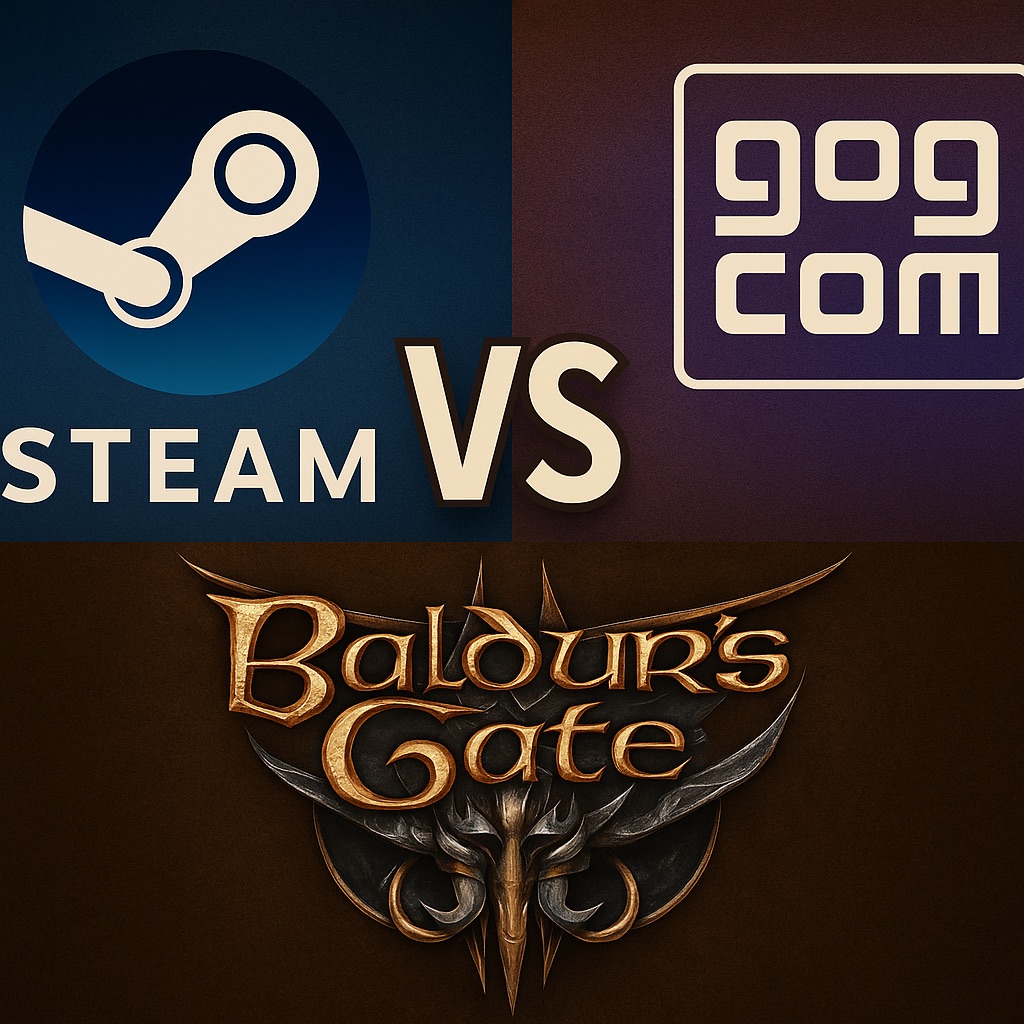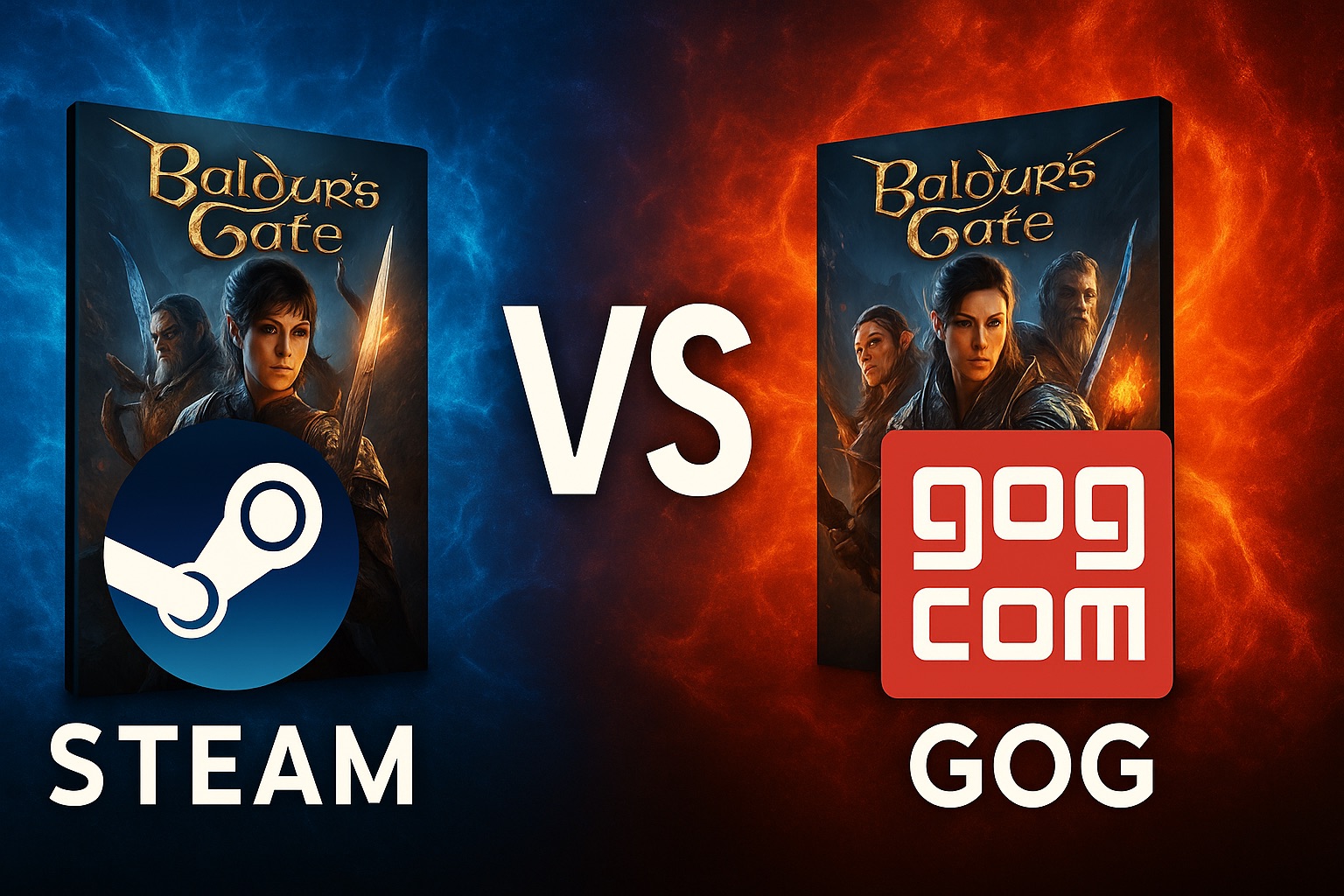Baldur's Gate 3 is more than just a fantasy RPG—it's a sprawling narrative playground where tactical choices collide with deep roleplaying, and your actions ripple throughout an evolving world. But before you're naming your character or navigating dialogue trees, there's a decision waiting for you in the real world: where should you buy it? Steam or GOG?
Both platforms offer the same phenomenal game. Same storyline. Same visuals. Same character arcs. But how you access that experience? That’s where things change—and where preferences start to matter. Whether you’re the type who values cloud saves or the one who keeps a library of offline installers, this choice is more than branding. It’s about how you want to play.
If you already know you’re going the Steam route, skip the scroll and grab your Baldur's Gate 3 Steam CD Key from RoyalCDKeys. But if you’re still torn, let’s lay it all out.

What You Get with Both Platforms
Let’s start with the obvious. No matter where you buy Baldur’s Gate 3, the content remains the same:
- Full access to the main campaign, companions, and game mechanics
- Voice acting, cutscenes, and visual fidelity at identical levels
- Timely updates (thanks to parity maintained by Larian Studios)
- Multiplayer capability, with slight technical differences
- Access to future patches and improvements
You're getting the same digital package. But what surrounds that package—how it’s handled, delivered, supported—differs in ways that could enhance or frustrate your experience depending on your preferences.
Steam: The Connected Giant
Steam is the most recognized PC gaming platform for a reason. It’s not just a store—it’s an ecosystem. Here’s what that means for you:
Perks:
- Cloud Saves: Seamlessly move from one machine to another without losing progress.
- Steam Workshop: Once mod support is officially integrated, expect a massive modding scene accessible with one click.
- Achievements & Badges: For those who enjoy milestones and community flair.
- Friends, Messaging, and Invites: The social features are baked in and frictionless.
- Automated Updates: You’ll always be on the latest version, often without realizing it.
Downsides:
- DRM Dependency: Steam must be running in the background to launch the game.
- Resource Load: More system processes, more overhead.
- License Model: You don’t technically own the files—just access to them via the platform.
Steam is ideal for players embedded in the ecosystem, who value seamless services and an integrated experience. It’s familiar, functional, and community-focused.
GOG: The Independent Experience
GOG (Good Old Games) caters to players who don’t want strings attached. It’s the place for DRM-free gaming, manual control, and digital ownership.
Advantages:
- No DRM: Once you buy it, it's yours. Download and play without any launcher or internet.
- Backup Flexibility: Keep a local copy, install it on multiple machines, and forget about activation limits.
- Cleaner Installs: Less background activity means a leaner system footprint.
- Privacy-First: GOG Galaxy (optional) doesn’t track as aggressively.
Considerations:
- Limited Social Features: Galaxy is improving but isn’t on par with Steam.
- Mod Management: You’ll need to install mods manually.
- Achievements? Maybe: Unless Larian implements them natively, you might miss them.
GOG is the choice for players who want simplicity, ownership, and control over their digital experience. It’s about freedom, not handholding.

Multiplayer Breakdown
Where this debate gets interesting is in multiplayer functionality. Yes, both platforms support online co-op, but:
- Steam offers easy invites, friends-list pairing, and voice chat via overlay.
- GOG supports multiplayer, but matchmaking often requires direct connection or more manual setup.
- Cross-play is supported, but not all social features translate.
If co-op storytelling and quick matchmaking are vital, Steam gets the nod.
Side-by-Side Comparison (In Text Form)
Let’s highlight the major differences in a concise list format:
- Ownership: Steam = license access; GOG = file ownership.
- Updates: Steam = automatic; GOG = manual control.
- DRM: Steam = required; GOG = none.
- Modding: Steam = workshop support; GOG = manual installs.
- Social Features: Steam = integrated; GOG = minimal.
- Performance Load: Steam = heavier; GOG = lighter.
- Offline Play: Steam = limited; GOG = unrestricted.
Which Is Right for You?
Pick Steam If:
- You enjoy community features and rich social interaction.
- Modding is part of how you play.
- You prefer automatic updates and minimal hassle.
- You already use Steam regularly.
Choose GOG If:
- You value true digital ownership and offline access.
- You have a minimalist setup or limited internet access.
- You don’t rely on achievements or integrated social tools.
- You like keeping full control over your files and installations.
Both platforms are excellent—just built for different preferences.
The Verdict
Buying Baldur’s Gate 3 is a win no matter the platform, but how you experience it can feel vastly different depending on your ecosystem. Steam is rich in features and convenience. GOG offers simplicity, freedom, and more control.
If you’re someone who cherishes mod support, ease of multiplayer, and social immersion, Steam is your natural fit. But if you lean toward minimalist setups, complete file access, and zero DRM, GOG becomes the better pick.
Whichever road you choose, the journey ahead is legendary.
Already decided? Grab your Baldur’s Gate 3 Steam CD Key now from RoyalCDKeys and step into Faerûn ready.
Your adventure awaits. Make it yours, your way.
Get yours now: https://royalcdkeys.com/products/baldurs-gate-3-steam
Discover more in our previous write-up: New DayZ Patch Notes: Steam Update Details